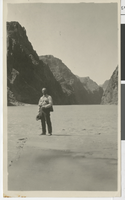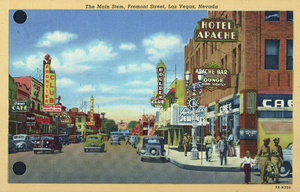Search the Special Collections and Archives Portal
Search Results

Transcript of interview with Elbert Edwards by Layne Covington, October 16, 1986
Date
Archival Collection
Description
On October 16, 1986, Layne Covington interviewed Elbert Edwards (born 1907 in Panaca, Nevada) about his life in Southern Nevada. Edwards first talks about his family background before talking about what it was like to live in Panaca. He then talks about changes in Southern Nevada, particularly those in Boulder City that have taken place over time. Edwards later talks about the work of his wife and both of their political involvement and his involvement and career in education. The latter part of the interview includes discussion of the building of Boulder Dam, Edwards’ job as a registrar in the Selective Service, and the effects that the war years had on Las Vegas.
Text
Neil H. Holmes oral history interview
Identifier
Abstract
Oral history interview with Neil H. Holmes conducted by James Greene on January 14, 1975 for the Ralph Roske Oral History Project on Early Las Vegas. Holmes discusses the Boulder City, Nevada education system, family life, employment opportunities, housing, and the building of Boulder (Hoover) Dam.
Archival Collection

Photograph of a man, Colorado River, 1920s
Date
Archival Collection
Description
Image
Steven Ligouri oral history interview
Identifier
Abstract
Oral history interview with Steven Ligouri conducted by Claytee White on January 20, 2010 for the Voices of the Historic John S. Park Neighborhood Oral History Project. Ligouri discusses his career as a sculptor making jewelry in his father's business and making the statue High Scaler at Hoover Dam. He also discusses living in the John S. Park Neighborhood and on a family farm in North Las Vegas, Nevada and Boulder City, Nevada.
Archival Collection
James Cashman Sr. Photograph Collection
Identifier
Abstract
The James Cashman Sr. Photograph Collection (approximately 1905 to 1975) consists of black-and-white photographic prints, negatives, slides, and albums as well as a glass plate negative. The photographs depict four major subjects: Cashman's family, friends, and associates; Cashman's businesses; the Hoover Dam and Colorado River; and various locations across Nevada.
Archival Collection
Franklin M. Murphy Photograph Collection
Identifier
Abstract
The Franklin M. Murphy Photograph Collection, dates from approximately 1929-1933 and consists of black-and-white photographic prints with 27 corresponding negatives. The majority of the images show locations in and around the current site of Hoover Dam and Lake Mead in southern Nevada and Arizona with a focus on the geology of the area; a smaller number show individuals and locations in Las Vegas, Nevada.
Archival Collection
Interview with Edith Allan
Identifier
Abstract
Oral history interview with Edith Allan conducted by Elizabeth Cleary on February 26, 1977 for the Ralph Roske Oral History Project on Early Las Vegas. Allan discusses living on a dairy farm, as well as her experiences working for Western Union and the Sal Sagev Hotel. Allan also mentions the building of Hoover Dam, Block 16, and the Stewart Ranch.
Archival Collection
Hicks, Harriett Thornton
Harriett Thornton Hicks was born June 8, 1913,in Parowan,Utah; the thirteenth
child of 14. She tells of her pioneer family who dwelled in two log cabins—one for
cooking and one for sleeping. In 1931, she moved to Las Vegas to join two older sisters
who had relocated here. She was picked up at the train by young Charles Hicks, who was
a friend of her sisters. Charles had a car and offered to provide transportation. Within
three years, the two were married. She quit her drug store job to raise a family and he
Person
Doris Hancock Photograph Collection
Identifier
Abstract
The Doris Hancock Photograph Collection (1882-1987) contains photographs of Las Vegas, Nevada educator Doris Hancock and her family. The collection includes images of Southern Nevada and surrounding areas, particularly the mining town of Rhyolite, Nevada, the Colorado River, the Hoover (Boulder) Dam, Red Rock Canyon, early Las Vegas, and Death Valley, California.
Archival Collection

Postcard showing Fremont Street, Las Vegas, Nevada, circa 1930s to 1940s
Date
Archival Collection
Description
Image
